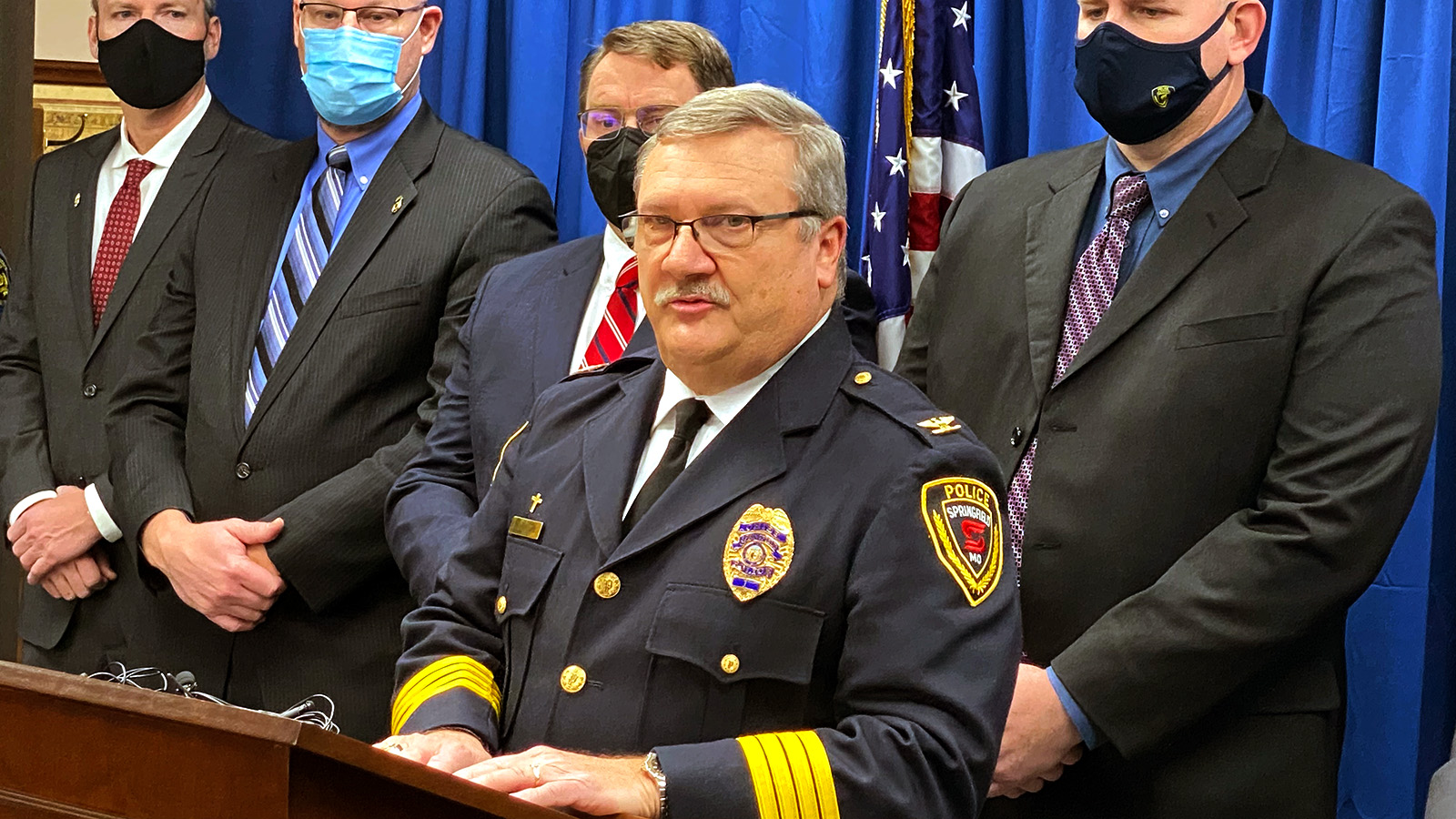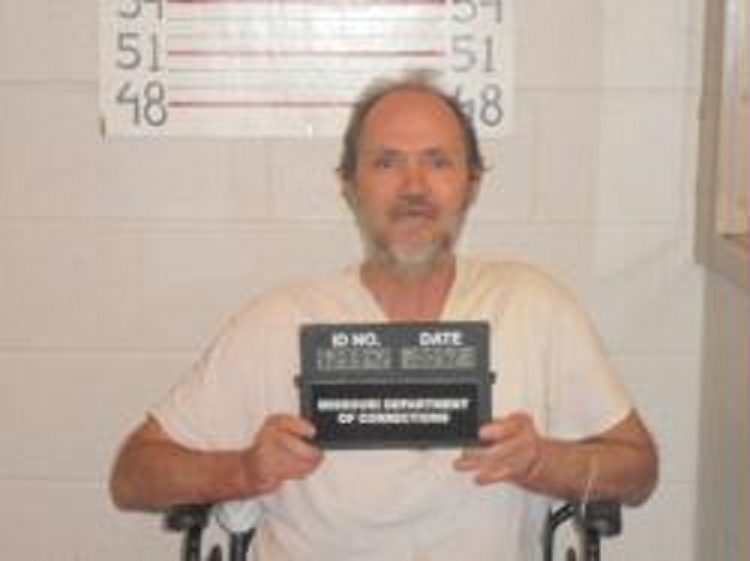Jurors deadlocked on deciding if a Springfield police officer used excessive force to arrest a homeless man with a knife in 2020.
The plaintiff, 58-year-old Devin Ledbetter now uses a wheelchair. Ledbetter is serving time in a Missouri prison for a conviction for unlawful use of a weapon, but appeared in court this week wearing plain clothes. He will likely be released from prison in a few months.
Ledbetter claims Officer Brandon Helmers picked up Ledbetter off the ground and slammed Ledbetter onto a piece of concrete, shattering Ledbetter’s pelvis and breaking both the ball and socket of one of his hip joints. Ledbetter claims he was not resisting arrest, and that he had willfully dropped his knife and was cooperating with the officers’ commands.
Helmers is represented by Christopher Hoeman, chief litigator in the civil division of the Springfield City Attorney’s Office.
During the trial in U.S. District Judge Roseann Ketchmark’s courtroom, Hoeman argued that Ledbetter was brandishing a large knife and not responding to the officers’ commands to drop the weapon.
Helmers testified that he did not lift Ledbetter into the air and slam Ledbetter down. Rather, Helmers said he pulled Ledbetter to the ground to handcuff him.
Ledbetter initially represented himself in the civil lawsuit, filing handwritten motions from the Greene County Jail in 2021.
In those early filings, Ledbetter had asked for $8 million in damages and also named Police Chief Paul Williams and then-Corporal Gilbert Correa as defendants.
Ketchmark later dismissed Williams and Correa from the suit; and appointed attorney Charles C. Eblen with Shook, Hardy & Bacon L.L.P. in Kansas City to represent Ledbetter.
What is next when there is a hung jury?
Despite not agreeing on a verdict, the jury answered two of the special verdict questions, which will help Judge Ketchmark decide if Helmers has qualified immunity under federal law as this case moves forward. Qualified immunity is a defense that’s sometimes available to government officials who are accused of violating people’s constitutional rights.
To the special verdict question of, “Did Helmers believe Ledbetter posed a safety risk to the officers at the time force was applied?” the jury answered yes. The jury also agreed this belief was reasonable.
However, on that other special verdict question of, “Did Helmers believe Ledbetter was resisting arrest at the time force was applied?” the jury said no.
After the jury was dismissed, Hoeman said he couldn’t give his opinion about what happened in court this week, because the case is still in active litigation. However, the defendant’s attorney offered some insights on what comes next.

“Based on their answers to the interrogatories (special verdict questions), we’re going to have some additional written motions and ask the court to rule on some legal issues. It is possible that the case could be resolved that way,” Hoeman said. “It is also possible that we’ll have to have a second trial to see if we can get to a unanimous verdict with a different jury.”
Eblen, Ledbetter’s attorney, said the fact that a jury couldn’t agree on a verdict speaks to how interesting — and close — this particular excessive force case is.
“There’s a lot of spirited disagreement on both sides as to how these things play out with police encounters,” Eblen said.
Eblen expects both sides will file briefs on the qualified immunity issue through the end of the year. If the judge grants Helmers qualified immunity, Eblen said that decision will be appealed to the Eighth Circuit Court of Appeals. If qualified immunity is not granted, Eblen expects a retrial in 2024.
Did the officer use excessive force?
According to information presented at the trial this week, Helmers and Correa were responding to a 911 caller reporting that someone was being held against their will in a tent at a homeless encampment around 4 p.m. Dec. 16, 2020.
When the officers entered some woods and approached the tent, they testified they heard a male voice say, “F— them” and a female voice say, “don’t hurt them.” The officers said Ledbetter then quickly emerged from the tent, holding a large knife.
The officers claim Ledbetter at first did not respond to their commands to drop the knife, but later dropped it.
Helmers testified Ledbetter was not responding to commands to move away from the knife, so Helmers pulled Ledbetter to the ground to handcuff him.
Correa testified Ledbetter was beginning to move away from the knife.
While Eblen said those inconsistencies in the officers’ stories were evidence of a lack of credibility, Hoeman argued it was a chaotic, stressful scene and it’s not unusual for police officers’ stories to vary slightly.
Eblen also argued that medical evidence proves simply pulling a person to the ground would not cause the extent of injuries Ledbetter suffered.
From the courtroom: Defense says force was justified, necessary
Twenty-five prospective jurors were called to the federal courthouse in downtown Springfield Oct. 23 to be questioned to decide if they can be fair and impartial.
Eblen asked each person if they felt either a police officer or someone who was incarcerated and had been homeless would be more credible — just by virtue of their position in life. Eblen also asked if they had a problem with the idea that if a citizen is injured by law enforcement, that the citizen can sue the officer for money damages if the evidence supports their claim.

Ultimately, six men and one woman were chosen to hear the case.
In his opening statements Monday, Eblen told the jury Ledbetter has spent the last three years and probably the rest of his life in a wheelchair because Officer Helmers “made a decision to punish Mr. Ledbetter by lifting him up in the air and slamming him onto concrete.”
“On this particular day, this officer went too far,” Eblen said. “You don’t see this (type of injuries) in slip-and-falls.”
Eblen said the Springfield police didn’t need to use any force to arrest his client because Ledbetter dropped the knife, had his hands up and was moving away from the knife as instructed by the officers. Eblen acknowledged Ledbetter had alcohol and substance abuse problems and has past criminal convictions.
“Medical evidence will show extreme force had to be used” to cause Ledbetter’s injuries, Eblen said in his opening statement. Eblen said the police officers’ stories about what happened have changed and are inconsistent with Ledbetter’s injuries.
Eblen disputed the officers’ narratives that the first thing Ledbetter said after being taken to the ground was that he’d already injured his hip earlier that day and that Ledbetter told them, “You guys didn’t do this. It happened earlier.”
Eblen said the officers spent hours editing their report about the incident.
“It’s curious and goes to the issue of credibility,” Eblen said
‘On the verge of escalating’
Hoeman, the attorney representing the officer, said in his opening statements that Helmers’ actions “were justified and necessary and based on the actions of the plaintiff Mr. Ledbetter.”
Hoeman said Helmers and Correa approached the tent, announced “Springfield Police” and Ledbetter “popped out of the tent” holding a large machete. Police officers told Ledbetter to drop the knife, and Hoeman said Ledbetter eventually did drop the knife. But then Ledbetter ignored the offers’ commands to move away from the knife.
Hoeman said Helmers holstered his gun, grabbed Ledbetter’s wrist and felt Ledbetter “tense up” and “immediately knew it was on the verge of escalating.” It was at that time, Hoeman said, Helmers put his hand on Ledbetter’s shoulder and pulled the man to the ground to be handcuffed.
Hoeman told the jurors they would spend the next two days dissecting what happened in a matter of seconds.
“Officer Helmers was experiencing this in real time,” Hoeman said, “giving commands that aren’t being followed.”
Hoeman pointed out Ledbetter has already admitted he displayed the knife to the police officers in a “threatening manner” when Ledbetter pleaded guilty to unlawful use of a weapon in 2021.
Plaintiff first to testify: ‘I've never resisted in my life'
On the witness stand, Ledbetter said he is originally from West Plains and has held a variety of jobs over the years, including machinist and sawmiller. At the time of his arrest, Ledbetter said he was walking up to 16 miles a day and “trying to get in good shape” because he wanted to move to Alaska.
“That’s all out the window now,” he said.
Ledbetter said he was staying with a friend at Fairvue Apartments, but went to a homeless encampment a few miles away that day.
“I’m a pretty heavy drinker and I don’t like to drink alone,” Ledbetter testified.
Ledbetter said he often hung out with his friends at the camp. Since it was cold, they’d build a fire. He said the knife in question, which has a 9-inch blade and serrated edge, was used to cut up wood and branches to burn.
Ledbetter testified when he heard the police outside of the tent, he thought it was a friend returning with fire wood, and that is why he had the knife in his hand.
Ledbetter said he came out of the tent and saw Officer Correa pointing a gun at him, Ledbetter dropped the knife and put his hands up. Ledbetter testified that Helmers, “scooped me up, carrying me three to five feet[…] and body slammed me on concrete.”
Ledbetter said he was complying with the officers orders, adding that he’s been arrested before and “I’ve never resisted an officer in my life.”
Ledbetter testified about his injuries and the pain. He explained about the first surgery to repair his pelvis and hip in which the surgeon used plates and screws and “about 89 staples to put me back together.”
He was released from the hospital eight days after the surgery and given a walker. Not long after, Ledbetter fell, which caused the plates and screws to “fall apart.”
A surgeon again tried to use pins and plates to repair the hip joint and pelvis, but it came apart again while he was still in the hospital. Ledbetter then had a third surgery, during which the surgeon sawed off the head of his femur in one of his legs. The leg is attached to his body by muscles, tendons and ligaments, but no longer with a femur connecting to the pelvis.
Asked about his guilty plea to the unlawful use of weapon charge, Ledbetter said he felt tricked by the public defender and prosecutor and didn’t agree that he admitted to displaying the knife in a “threatening manner.”
Ledbetter said needing someone to push his wheelchair is “depressing” and said he continues to have bad dreams about the incident.
During cross examination, Hoeman asked Ledbetter about his medical records in which Ledbetter had reported having arthritis in his hips and that he used a cane “half the time.”
Ledbetter denied reporting hip problems prior to being injured during the 2020 arrest.
Ledbetter admitted he had been drinking “for several hours,” at the time of the arrest and that he wasn’t taking his medication to treat schizophrenia. He also admitted to having drunk “two beers” before falling the second time.
Officers, Springfield police chief testify via deposition videos
Ledbetter’s attorney played three deposition videos on Oct. 23.
In his deposition, Helmers was questioned about his fitness routine and his experience with mixed martial arts and Brazilian jiu-jitsu. Helmers said he’d been boxing since he was 16 and, at the time of the deposition, could deadlift around 330 pounds.
Helmers said hasn’t competed at an MMA match since 2013, but continues to train in the sport and do “light sparring.”
Helmers defined “excessive force” as “more force necessary to stop whatever threat.”
Asked what he remembers about Ledbetter, Helmers said, “his aggressive nature and being an older man.”
Helmers denied picking up Ledbetter off the ground.
“I grabbed him and pulled him down,” Helmers said. He described feeling Ledbetter “tense up” when Helmers grabbed Ledbetter’s wrist. Helmers said he was concerned because Ledbetter wasn’t following the officers’ commands to move away from the knife.
Asked why Helmers didn’t tell Ledbetter to put Ledbetter’s hands behind his back and attempt to handcuff him standing up, Helmers said it was “due to his aggressive nature when he came out of the tent.”
Portions of Correa’s deposition video were played in court Monday. Correa retired from the Springfield Police Department.
Correa described Ledbetter quickly emerging from the tent, holding the knife. He said both officers yelled at him to drop the knife “over and over.”
After Ledbetter dropped the knife, Correa said he turned his focus to the tent and to see if anyone was inside. Because he was looking at the tent, Correa testified he did not see what Helmers did to get Ledbetter to the ground.

Springfield Police Chief Paul Williams was not present when Ledbetter was injured, but spoke generally about the department’s policies about use of force during his deposition.
“The idea is to always use the least amount of force,” Williams said. “The intent is to avoid injuries to both parties,” meaning police officers and the person or persons being detained.
Williams testified that the “vast majority” of arrested persons are handcuffed while standing. Asked if he agrees that handcuffing someone while they are standing as opposed to on the ground requires less force, Williams said, “absolutely.”
Doctor says injuries not consistent with officer’s story
Dr. Paul Olive, an orthopedic surgeon who practiced in southwest Missouri for 28 years, testified on behalf of the plaintiff. Olive retired five years ago and now does medical legal consultation work. He testified about the extent of Ledbetter’s injuries, the amount of force it would take to cause such an injury and give an estimate on Ledbetter’s future cost of care.
Olive said he’s dealt with similar hip injuries more than 100 times.
To fracture both the ball and socket of the hip join as well as the pelvis requires a “significant amount of force,” Olive said.
This specific type of injury is called a fracture dislocation of the hip and is usually caused by head-on vehicle collisions, pedestrians being hit by vehicles or by a person falling from a height of about 10 feet, Olive said.
Olive was in court on Monday, listening to the testimony about how Helmers says he “took down” Ledbetter.
Olive said he does not believe Ledbetter’s injuries could result from being “pulled down.”
“Obviously I wasn’t there and I don’t know exactly what happened,” Olive said, adding that Ledbetter’s injuries were the result of “high-energy trauma.”
One of the jurors submitted a similar question for the doctor, asking if Olive believed being “pulled down onto concrete” could cause the injuries.
Olive answered no.
As far as the cost of Ledbetter’s future care, Olive said Ledbetter will need to be in an assisted living facility for the rest of his life. In the doctor’s view, Ledbetter will need help cooking meals, cleaning and taking care of himself.
“This will never get better,” Olive said of Ledbetter’s injuries.
Olive used the Social Security Life Expectancy Table to estimate that Ledbetter will live another 22 years. Olive estimates it will cost $645,000 for Ledbetter to live out his days at reasonably priced assisted living facility in this area and $320,700 for maintenance physical therapy for the rest of Ledbetter’s life — something Olive said Ledbetter needs not to improve the hip injury, but to keep the rest of Ledbetter’s body from getting weaker.
Olive said Ledbetter will also need a power scooter and a yearly visit with a doctor.
All told, Olive estimated Ledbetter’s future cost of care to be about $983,800.
Officers testify about 2020 incident
Both Correa and Helmers testified on Oct. 24.
Correa said the officers drew their guns when they saw the large knife in Ledbetter’s hand.
“He’s got a deadly weapon in his hand,” Correa said. “We don’t know his intentions.”
Correa said both officers were yelling at Ledbetter to drop the knife and after repeated commands, Ledbetter did drop the knife.
The officers then began yelling at Ledbetter to move away from the knife. Asked if Ledbetter complied with this command, Correa said, “not initially, but he does.”
Correa said he then turned his attention to the tent and did not see what Helmers did to get Ledbetter on the ground.

Helmers was the last witness to testify at the trial.
Helmers explained that police have a hierarchy of whose safety they are most concerned with. At the top are hostages, followed by innocent people, then police officers. At the bottom is the safety of crime suspects.
Helmers said his biggest concern at that time was, “(Ledbetter) would pick up the knife or he would turn and get back in the tent,” and hold whomever was in the tent hostage.
Helmers testified that despite being ordered to move away from the knife, Helmers did not see Ledbetter move.
“I started to escort him away from the knife,” Helmers said.
Asked if Helmers still considered Ledbetter a threat even after the knife was on the ground, Helmers said yes.
“If he starts to pull away or fight,” Helmers said, “we’ve just put a weapon in there.”
A juror submitted a question for Helmers, asking why Helmers felt it was safe to holster his weapon and approach Ledbetter.
“Honestly I didn’t feel safe,” Helmers said. “Hostages and innocents are above the police. We have to, in our job, risk our lives in those situations to get containment of the threat.”

